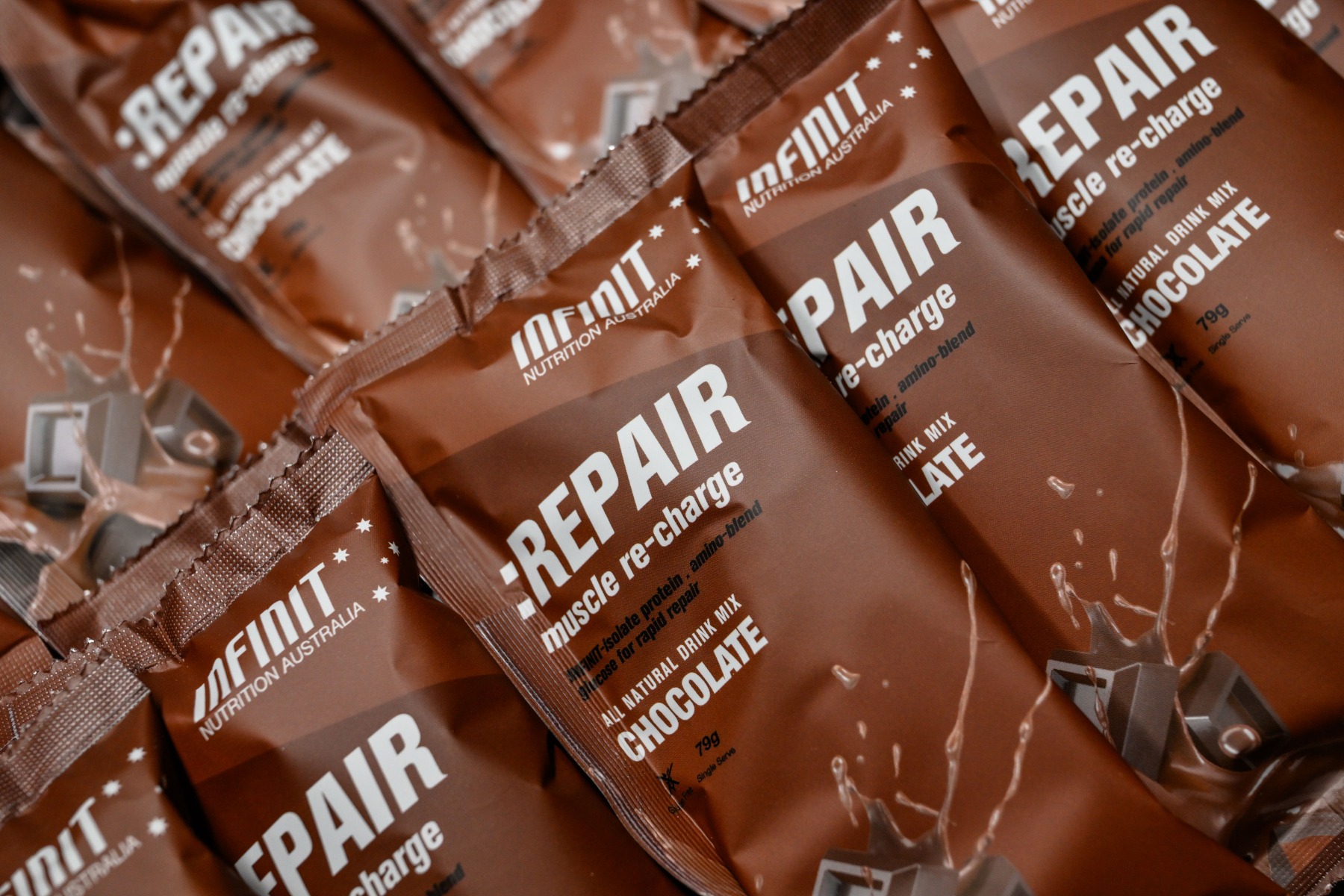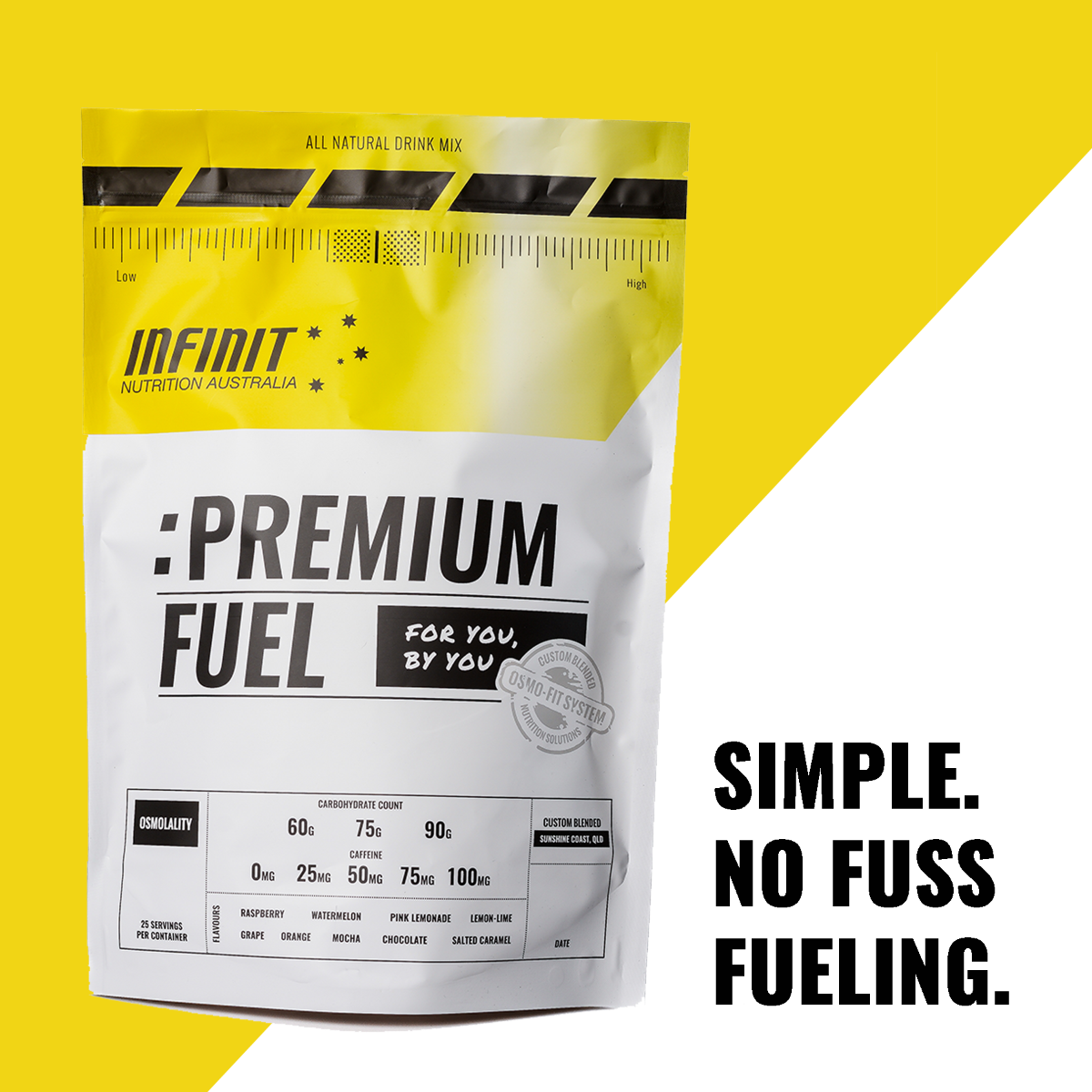What is Creatine? I Creatine Supplementation
- 23 Jan 2024
Creatine at a Glance:
- INFINIT offers 400mg non-GMO, vegan friendly Creatine Monohydrate per serving as an optional “Extra” for Custom Formulas.
So What Exactly is Creatine?
Creatine is a naturally occurring organic acid that essentially acts as a “fuel source” for ATP (the energy currency of the body). Creatine is naturally synthesised in the liver, and transported in the blood to the muscles. Creatine can also be taken in small doses through a healthy diet, and is found in food sources like meat and fish.
In the muscle, creatine works as a part of phosphocreatine (PCr), a high-energy phosphate donor, which acts to restore ATP for short bursts of energy. This particular energy system is mainly used during anaerobic efforts, acting in the first 8-10 seconds of exercise. Supplementing with creatine can help to produce more ATP and therefore increase the intensity of your training.
Creatine supplementation can be a tool to help an athlete do more work as it allows for intermittent sprints or lifting work to be done for a longer period of time, thus increasing training load capacity. One way you can look at it, is to think of creatine like a gas tank: If the tank is topped off, it will allow the car to go further. If your phosphocreatine system is “topped off” with extra creatine, it will allow your body to go further, giving you that last 1%.

How Creatine Supplementation can Benefit Endurance Athletes
As we know endurance sports are often multifactorial. Race dynamics, elevation changes, course design, and other factors might influence how an athlete paces themselves. Endurance races are rarely performed at a steady pace and often require multiple surges of maxmimal effort and intensities (may it be the sprint to the finish or passing a competitor) these changes in pace requires the recruitment of fast twitch (type II) glycolytic muscle fibers for increased power.
Creatine supplementation can allow for the increase in PCr and free creatine within the body to increase the capacity for faster PCr synthesis during the recovery periods of intense power outputs. The increase in intramuscular concnetrations of PCr leads to the greater reliance on this system during intense efforts and has shown to be associated with improved time until exhaustion, repeated sprints, anaerobic work capacity, and time trial performance.
Creatine Supplementation Practices
So how does creatine supplemention work and how does it influence the availability of creatine and phosphocreatine (PCr) within the muscle? Supplementing has been shown to increase creatine stores in the muscle from 0-40% higher than pre-supplementation storage in muscle tissue (it should be noted that the highest increases are observed in vegetarians and vegans who are new to creatine supplementation).
Most experts recommend two main “phases” of Creatine supplementation: The loading phase and the maintenance phase.
The loading phase generally last about 5-7 days, and calls for the athlete to take in a significant amount of creatine, spread out over 4-5 times per day. Research shows an effective loading phase dosage ranges from 15-30 grams per day. Additional studies also show that lower doses (3 grams per day) over a longer period of time (30 days) produces similar results.
During the loading phase, the body stores muscle creatine to capacity and the remaining creatine is excreted in the urine. These findings suggest that the “loading” phase of creatine supplementation can actually be reduced in duration with the same effect. In fact, some studies speculate that eliminating a “loading” phase all together will produce similar results without the excess urinary excretion.
The maintenance phase follows the loading phase, and involves taking a much lower daily dose of 1.5-3.5 grams spread out over per day for about 3 weeks (although some studies extend the maintenance phase up to 11 weeks in duration).
We now make it easy to hit your maintenance dose levels simply by drinking your INFINIT Custom Mix! Just select the Creatine Monohydrate option when you’re selecting your bag size, and your Custom Fuel Blend will contain a level that aligns with the recommended maintenance dosage (400mg of Creatine Monohydrate per serving).
Not all Creatines are Created Equal
In our INFINIT Custom Mix we use Creatine Monohydrate over the various other forms of creatine because we firmly believe it is the best form of creatine available today. Not only is it the most widely used form of creatine in scientific research but it is also the most pure form found in nature and provides the body with 88% pure creatine per molecule.
Potential Side Effects of Creatine Supplementation
A noticeable side effect of creatine supplementation is a reduction in urine production in the first 3 days of creatine loading. This effect is thought to be attributed to the osmotic load of creatine, which causes water retention, and ultimately accounts for the weight gain that is standard with early creatine supplementation.
Creatine + Beta-Alanine

One particular note of interest comes from the effects of supplementing both creatine and beta alanine on athletic performance. For example, the dual supplementation was tested during a 10 week resistance training program for football players. The study found significant changes in lean body mass and body fat percentage in the combined supplementation group, compared to the creatine only group or placebo group. Along with the difference in body composition, significant improvements in VO2 max and power output at lactate threshold (LT) were also seen in the combined supplementation group.
So, simply put, creatine is a well-researched ergogenic aid, which has been proven to be effective in enhancing athletic performance by helping to combat fatigue during your workouts. Extending the time it takes for your muscles to fatigue allows you to work out longer and with more intensity, ultimately improving your strength and muscle size, which can have profound effects on your training.
Sources
A., D., & A. (2015, December). Nutrition and Athletic Performance. Medicine & Science in Sports & Exercise, 543-568.
- Buford, T. W., Kreider, R. B., Stout, J. R., Greenwood, M., Campbell, B., Spano, M., . . . Antonio, J. (2007, August 30). International Society of Sports Nutrition position stand: Creatine supplementation and exercise. J Int Soc Sports Nutr Journal of the International Society of Sports Nutrition, 4(1), 6. doi:10.1186/1550-2783-4-6
- Dunford, M., & Doyle, J. A. (2008). Nutrition for Sport and Exercise (Second ed.). Belmont, CA: Thomson Wadsworth.
- Jenkins, J. A., MD. (n.d.). Creatine Supplementation in Athletes: Review. Retrieved from http://www.rice.edu/~jenky/sports/creatine.html
- Kendall, K., PhD, & Hyde, P., BS. (2015). Beta-Alanine Supplementation and Exercise Performance. Sports, Cardiovascular, and Wellness Nutrition: Pulse, 34(1), winter 2015, 1-5.
- Loon, L. J., Oosterlaar, A. M., Hartgens, F., Hesselink, M. K., Snow, R. J., & Wagenmakers, A. J. (2003). Effects of creatine loading and prolonged creatine supplementation on body composition, fuel selection, sprint and endurance performance in humans. Clinical Science, 104(2), 153. doi:10.1042/cs20020159
- Physiological and Health Effects of Oral Creatine Supplementation. (2000). Medicine & Science in Sports & Exercise, 32(3), 706-717. doi:10.1097/00005768-200003000-00024





